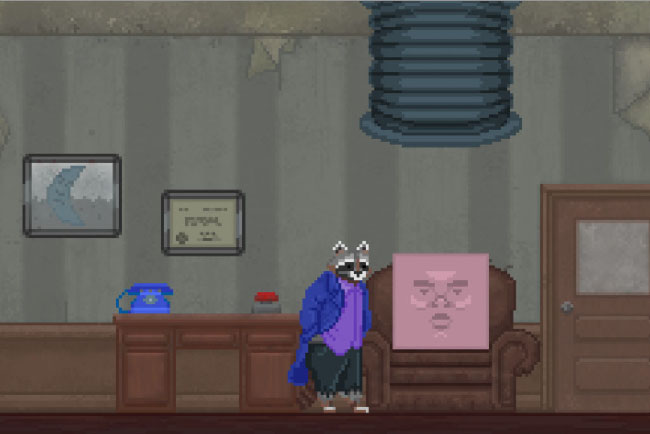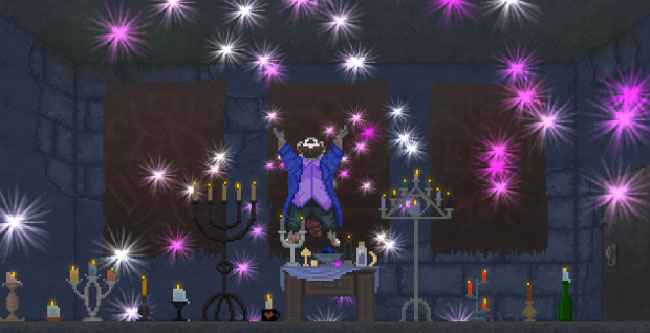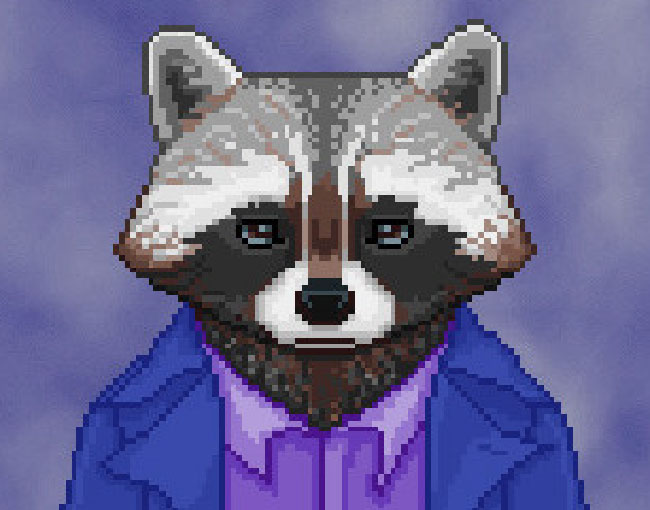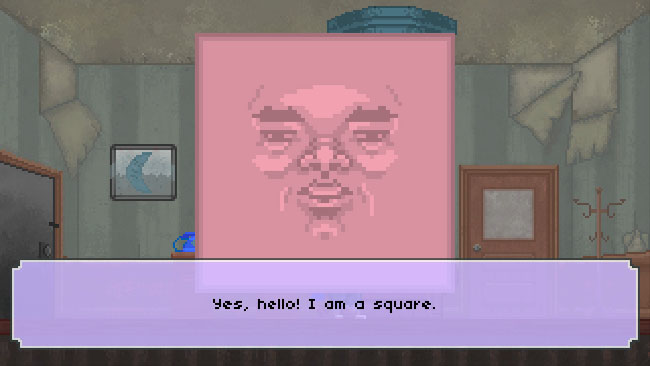Indie film company FilmCow, founded by Jason Steele, is behind viral hits Llamas with Hats and Charlie the Unicorn—but FilmCow has also made games too, through its Cat Night Games subdivision. The Raccoon Who Lost Their Shape is one of them, a quirky game where you take on the role of a raccoon detective that communes with the spirits of sentient shapes that have died. It’s good for anyone who enjoys nonhuman casts.

Setting the Stage
This bizarre world is depicted in a nicely done pixel art style, and it has limited animation that adds to the charm. On top of that, The Raccoon Who Lost Their Shape contains a mix of dry wit and absurd humor. For example, I cracked up at the gaudy summoning scenes, which were a striking contrast to the game’s more low-key dialogue system.
The weird setting of The Raccoon Who Lost Their Shape also feels like an experimental play confined to a limited stage, where only two areas can be accessed—Raccoon’s office, and a room used for summoning.
The Raccoon Who Lost Their Shape features a good chiptune score, which sometimes has a playfully spooky beat. It all meshes well with the game’s pixel art and occult overtones.
The game plays within a web browser, works with simple controls, and can be completed in one sitting, making it easy to pick up and finish for anyone on a busy schedule. On top of that, it’s free.

A Raccoon’s Investigation
The eponymous and playable character is like an entirely dead-eyed Rocket Raccoon—but wearing a more casual outfit rather than space gear. To successfully summon ghosts, clients must give Raccoon objects related to said ghosts that they want to communicate with; and the medium always does the summoning ritual in isolation, away from their clients.
(There’s a small plot hole with this summoning mechanic—why can’t the client be right there in the room with Raccoon when they summon the spirit that said client wants to communicate with?—but it’s a minor detail that can be easily ignored.)
Raccoon later reveals that the summoning ritual actually feels negative to them—like an uncomfortable brush with death—which could partly explain their regularly despondent attitude.

An ongoing plot thread creeps up in the game when Raccoon repeatedly asks the dead if they’ve seen any crescents in the afterlife, in addition to passing along messages from living clients. A framed image of a crescent hanging in Raccoon’s office serves as a nice background detail that ends up supporting this story.
The game eventually reveals that Raccoon is searching for their significant other, a crescent lost in a fire. The inferno not only burned their loved one, but everything Raccoon could have used to speak with them. (It had been the couple’s home that burned down, along with every object they owned.)
Raccoon is left alone with their own growing despair, and only one option: to search for their crescent by continually questioning other spirits they can summon through objects that clients bring them.
Chatting with Ghosts
Themes of longing and communication are found throughout The Raccoon Who Lost Their Shape, on both a large and small scale. It’s clearly felt in the game’s main action revolving around communicating with the dead, and becomes more apparent when Raccoon’s own search for a lost love is revealed. But it also proves to be a part of many aspects of The Raccoon Who Lost Their Shape.
For example, communication gets even more emphasis with one client, a parallelogram first introduced as almost constantly joking. But then the ghost he wishes to speak with reveals that joking helps him communicate better, helps him think about what to say.
It’s not the only time The Raccoon Who Lost Their Shape turns what initially seems like a gag into something more serious. A ridiculously obnoxious and arrogant client eventually turns out to be a symptom of discrimination embedded deep in the society of sentient shapes.
Ultimately, besides the humor it offers, The Raccoon Who Lost Their Shape is a relaxing, soothing, and thoughtful game, with a lot of strength in its writing.




